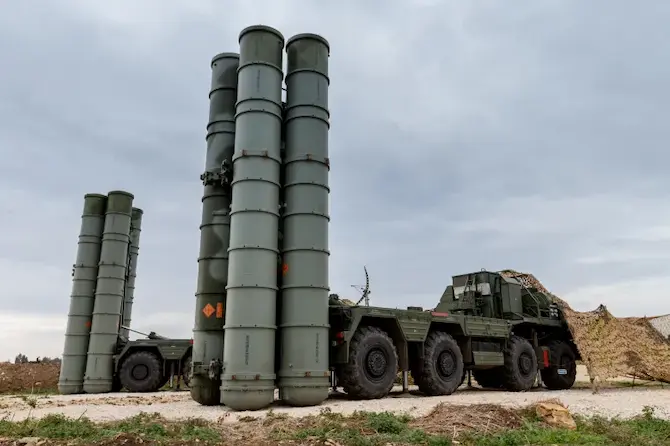
Turkey eyes a return to the U.S. F-35 program, speculation swirls over its unused Russian S-400 air defense systems
Turkey’s Strategic Pivot: From Moscow’s Missiles to Washington’s Jets
S-400 Gamble – In a dramatic shift that’s rattling geopolitical fault lines, Turkey is reportedly preparing to offload its Russian-made S-400 Triumf air defense systems, a move aimed at rejoining the U.S.-led F-35 Joint Strike Fighter program. The S-400 deal, signed with Russia in 2017 for $2.5 billion, had led to Turkey’s expulsion from the F-35 consortium and triggered U.S. sanctions under CAATSA.
Table of Contents
Now, with Ankara unveiling its indigenous “Steel Dome” air defense initiative, Turkish President Recep Tayyip Erdoğan appears ready to abandon the Russian systems altogether. The S-400s, which were never fully integrated or activated, remain locked in storage unused and politically toxic.
This pivot is more than a military upgrade; it’s a diplomatic recalibration. Turkey’s renewed engagement with the U.S. comes amid rising tensions with India, especially after Ankara’s vocal support for Pakistan during the recent India-Pakistan conflict. The question now is: what happens to the S-400s?
Pakistan in the Crosshairs: A Missile Deal That Could Redefine South Asia
Enter Pakistan. A former Turkish minister recently suggested that Islamabad could be a potential buyer of the dormant S-400 systems. While no official confirmation has emerged, the mere possibility has sent shockwaves through New Delhi’s strategic circles.
Pakistan’s interest in acquiring advanced air defense capabilities is no secret. With India already deploying S-400 units along its western border, a similar system in Pakistani hands would dramatically alter the regional balance of power. It would also mark the first time two adversaries operate the same high-end Russian platform, raising concerns about countermeasures, spoofing, and electronic warfare vulnerabilities.
However, the path to such a deal is riddled with obstacles:
- Russia’s End-User Agreement: The original S-400 contract prohibits resale or transfer without Moscow’s consent. Any unauthorized sale could breach international arms control norms.
- U.S. Pressure: Washington may oppose the transfer, especially if it undermines its Indo-Pacific strategy or strengthens a nuclear-armed rival.
- India’s Reaction: New Delhi could retaliate diplomatically or economically, further straining ties with Ankara and potentially lobbying Moscow to block the deal.
Despite these hurdles, the Turkey-Pakistan defense partnership has deepened in recent years, with joint projects in drones, naval vessels, and training programs. The S-400 speculation, while unconfirmed, fits into a broader pattern of strategic alignment.
The Russian Dilemma and India’s Strategic Calculus
For Russia, the situation is delicate. On one hand, Moscow values its defense ties with both India and Turkey. On the other, allowing a resale of the S-400 to Pakistan could jeopardize its lucrative arms relationship with New Delhi, which includes not just S-400s but also submarines, tanks, and fighter jets.
India, for its part, has remained officially silent but is reportedly monitoring the developments closely. The Modi government has recently strengthened ties with Turkey’s rivals Cyprus and Greece and increased defense cooperation with Armenia, signalling its displeasure with Ankara’s pro-Pakistan tilt.
If the S-400 deal with Pakistan materializes, India may respond by:
- Accelerating indigenous missile defense programs like the XRSAM and Prithvi Air Defence (PAD) systems.
- Expanding strategic partnerships with the U.S., France, and Israel to diversify its defense portfolio.
- Reassessing its own S-400 deployment strategy, including potential upgrades or countermeasures.
The broader implication is clear: the S-400 saga is no longer just about missiles, it’s about alliances, trust, and the future of multipolar diplomacy.
Conclusion:
The rumored S-400 transfer from Turkey to Pakistan is a geopolitical powder keg. While still speculative, it underscores the shifting sands of global defense politics, where yesterday’s allies become today’s rivals, and military hardware becomes a tool of strategic signaling. As Turkey courts the West and distances itself from Russia, the fate of its S-400s could reshape the security architecture of South Asia. For India, the message is stark: in a world of fluid loyalties, vigilance is the only constant.
Stay updated with the latest news on Rapido Updates. Keep yourself updated with The World, India News, Entertainment, Market, Automobile, Gadgets, Sports, and many more